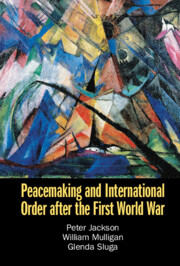 |
| Source: CUP |
:
Description:
The Paris peace settlements following the First World War remain amongst the most controversial treaties in history. Bringing together leading international historians, this volume assesses the extent to which a new international order, combining old and new political forms, emerged from the peace negotiations and settlements after 1918. Taking account of new historiographical perspectives and methodological approaches to the study of peacemaking after the First World War, it views the peace negotiations and settlements after 1918 as a site of remarkable innovations in the practice of international politics. The contributors address how a wide range of actors set out new ways of thinking about international order, established innovative institutions, and revolutionised the conduct of international relations. They illustrate the ways in which these innovations were merged with existing practices, institutions, and concepts to shape the international order that emerged out of the Paris Peace Conference of 1919.
Table of Content:
1 - Introduction pp 1-34
By Peter Jackson, William Mulligan, Glenda Sluga
Part I - Ordering Concepts pp 35-176
2 - Vocabularies of Self-Determination in 1919 pp 37-64
The Co-Constitution of Race and Gender in International Law
By Sarah C. Dunstan
3 - Recasting the ‘Fabric of Civilisation’ pp 65-90
The Paris Peace Settlement and International Law
By Marcus M. Payk
4 - State Sovereignty pp 91-113
By Leonard V. Smith
5 - The Crisis of Power Politics pp 114-150
By Peter Jackson, William Mulligan
6 - The Challenge of an Absent Peace in the French and British Empires after 1919 pp 151-176
By Martin Thomas
Part II - Institutions pp 177-286
7 - A ‘New Diplomacy’? pp 179-201
The Big Four and Peacemaking, 1919
By Alan Sharp
8 - The League of Nations pp 202-226
The Creation and Legitimisation of International Civil Service
By Karen Gram-Skjoldager
9 - The Treaty of Versailles, German Disarmament and the International Order of the 1920s pp 227-245
By Andrew Webster
10 - Planning for International Financial Order pp 246-265
The Call for Collective Responsibility at the Paris Peace Conference
By Jennifer Siegel
11 - Raw Materials and International Order from the Great War to the Crisis of 1920–21 pp 266-286
By Jamie Martin
Part III - Actors and Networks pp 287-378
12 - The Great Conversation pp 289-312
A Discussion on Peace after the First World War
By Carl Bouchard
13 - An Alternative International Relations pp 313-336
Socialists, Socialist Internationalism and the Post-War Order
By Talbot Imlay
14 - The Paris Peace Conference and the Origins of Global Feminism pp 337-360
By Mona L. Siegel
15 - Colonial Nationalists and the Making of a New International Order pp 361-378
By Erez Manela
Part IV - Counterpoint pp 379-414
16 - The Persistence of Old Diplomacy pp 381-406
The Paris Peace Settlement in Perspective
By T. G. Otte
Afterword
Afterword pp 407-414
New Histories of International Order